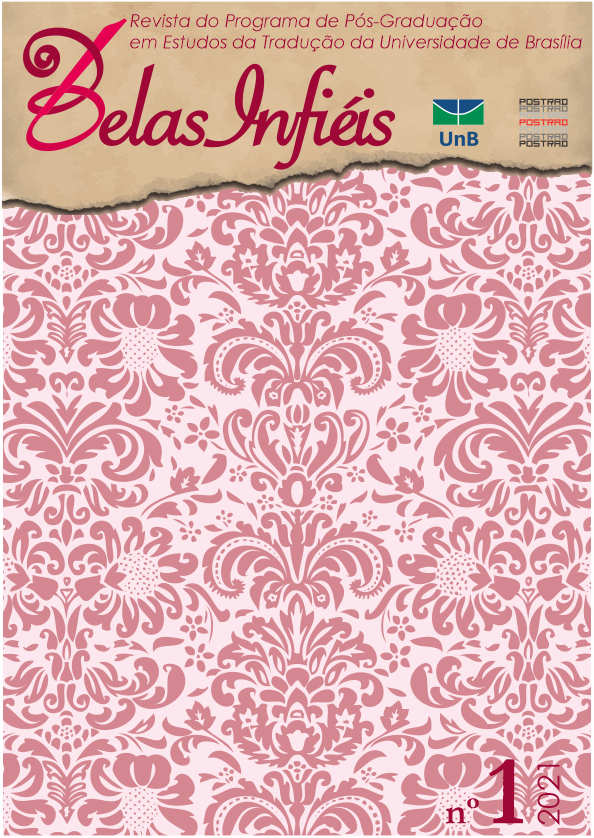The King’s Speech: The Appraisal System as a Translation Analysis Instrument
DOI:
https://doi.org/10.26512/belasinfieis.v10.n1.2021.32412Keywords:
Original Text. Subtitle. Dubbing. Appraisal System. The King’s Speech.Abstract
In many audiovisual productions, the linguistic discrepancy between subtitles and dubbing is observed. This study has aimed to investigate how the appraisal mechanisms of language (Martin, 2000; Martin & Rose, 2003; Martin & White, 2005) are present in King George VI's speech, in the film The King's Speech (Hooper, 2010), available on DVD, in comparison to the Brazilian Portuguese subtitling and dubbing, in order to verify the attitudinal shifts (Maciel & Rodrigues-Júnior, 2017) in these three instances of the same discourse. In order to carry out the analyses, the theoretical-methodological contribution of Systemic-Functional Linguistics, proposed by Halliday (1994), and the Appraisal System, more specific the Attitude framework, proposed by Martin and White (2005), inserting in the scope of interpersonal metafunction, are considerated. Initially, using the concepts of appraisal, retextualization (Vasconcellos, 1997) and agnation (Matthiessen, 2001), the role of the translator was settled, becoming a participant in the translated texts. The analyses have shown that the lexical choices of the translator can impact the translated text in three ways: keeping the evaluation present in the original text; changing the type of evaluation; or creating/excluding an evaluation. It is necessary to point out that, to translate a text, not only linguistic knowledge is important, but also textual and discursive. The predominance of appreciations of valuation was also observed, indicating that the king attributed value to things, not specifically to people. Thus, the king uses language to make the population aware of the catastrophic situation they were living in, to depreciate the enemy’s purposes and to value the task they would face, expressing his feelings on his lexical choices. That is, through his influence as monarch, he tried to unite the population against the common enemy: Nazism.
Downloads
References
ALMEIDA, F. A. S. D. P. Os elementos de Atitude no discurso do professor: um exercício em Análise do Discurso Sistêmico-Funcional. São Carlos: Pedro & João Editores, 2010.
CATFORD, J. C. A linguistic Theory. London: Oxford University Press, 2012.
DÖRNYEI, Z. Quantitative, Qualitative And Mixed Methods Research. In: DÖRNYEI, Z. Research Methods In Applied Linguistics. Oxford: Oxford University Press, 2007. p. 24-47.
FRANÇA, L. H. Entrevista. In: BENEDETTI, I. C.; SOBRAL, A. (org.). Conversas com tradutores: balanços e perspectivas da tradução. São Paulo: Parábola Editorial, 2003
FUZER, C.; CABRAL, S. R. S. Introdução à Gramática Sistêmico-Funcional em língua portuguesa. Campinas: Mercado de Letras, 2014.
HALLIDAY, M. A. K. An Introduction to Functional Grammar. 2. ed. London: Arnold, 1994.
HALLIDAY, M. A. K; MATTHIESSEN, C. M. I. M. An introduction to functional grammar. 3 ed. London: Holder Educaciona, 2004.
MACIEL, T. F. S.; RODRIGUES-JÚNIOR, A. S. “Estudo comparativo das atitudes avaliativas de Oscar Wilde na carta De Profundis e sua tradução para o português brasileiro”. Trabalhos em Linguística Aplicada, Campinas, SP, n. 56.3, p. 935-954, set./dez. 2017.
MAPA DE LONDRES. O discursos do Rei e a história de George VI, o pai de Elisabeth II. Disponível em: <https://mapadelondres.org/o-discurso-do-rei-george-vi/>. Acesso em: 06 mar. 2019.
MARTIN, J. R. Beyond Exchange: Appraisal system in English. In: HUNSTON, S.; THOMPSON, G. Evaluation in text: authorial stance and the construction of discourse. Oxford: Oxford University Press, 2000.
MARTIN, J. R; ROSE, D. Working whit discourse: meaning beyond the clause. London: Continuum, 2003.
MARTIN, J. R; WHITE, P. The language of evaluation: appraisal in English. New York: Palgrave, 2005.
MATTHIESSEN, Christian. M. I. M. The environments of translation. In: STEINER, Erich; YALLOP, Colin (Ed.). Exploring translation and multilingual text production: beyond content. Berlin/New York: Mouton de Gruyter, 2001. p. 41-124.
MELLO, G. M. G. G. O tradutor de legendas como produtor de significados. Tese (Linguística Aplicada à Tradução) ”“ UNICAMP. Campinas, 2005.
MUNDAY, J. Evaluation in translation: critical points of translator decision-making. London/New York: Routledge, 2012.
THE king’s speech. Direção: Tom Hooper. United Kingdom, 2010. 118 min.
VASCONCELLOS, M. L. B. Retextualizing Dubliners: a systemic functional approach to translation quality assessment. Tese (Pós-Graduação em Inglês e Literatura Correspondente) ”“ Universidade Federal de Santa Catarina, Florianópolis, 1997.
VIAN JR., O. “O sistema de avaliatividade e os recursos para gradação em língua portuguesa”: questões terminológicas e de instanciação. DELTA, v. 25, n. 1, 2009, p. 99-129.
Downloads
Published
How to Cite
Issue
Section
License
Copyright (c) 2021 CC BY

This work is licensed under a Creative Commons Attribution 4.0 International License.
Given the public access to this journal, the texts are free to use but requires the recognition of the original authorship and initial publication in this journal to be properly stated.
 The journal allows the use of works published for non-commercial purposes, including the right to submit the work to publicly accessible databases. Published contributions are the sole and exclusive responsibility of the author(s).Â



















